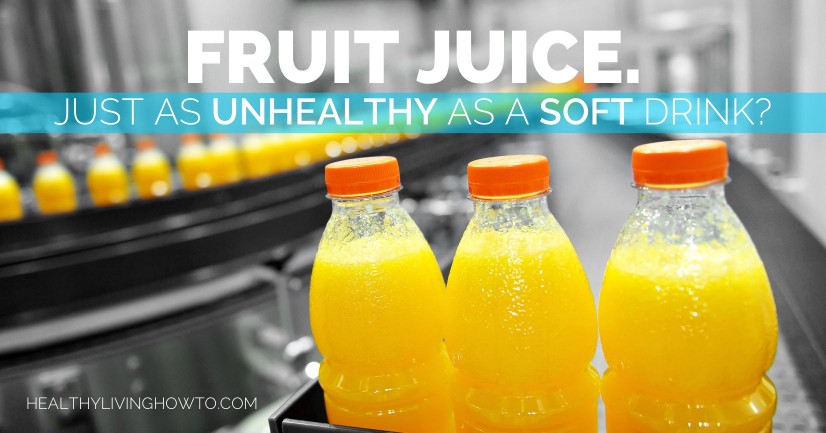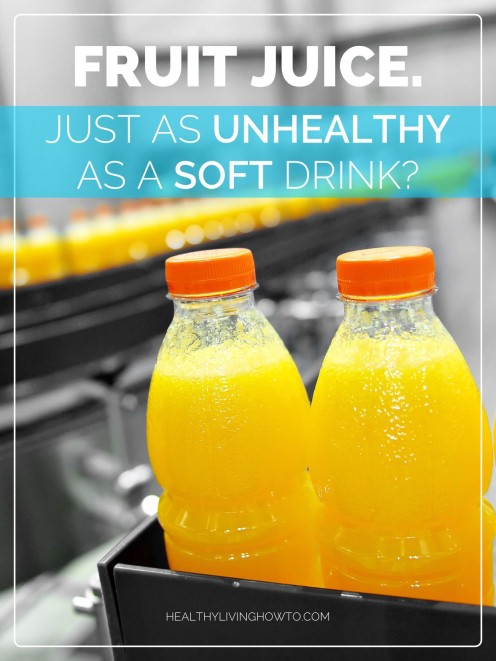Fruit juice is often perceived as healthy. That’s understandable, given that it is natural and has the word “fruit” in it. However… what many people fail to realize is that fruit juice is also loaded with sugar. In fact, fruit juice contains just as much sugar and calories as a sugary soft drink… and sometimes even more (1).
Fruit Juice. Just as Unhealthy as a Soft Drink?
The small amounts of vitamins and antioxidants in the juice do not make up for the large amount of sugar.
Fruit Juice Isn’t Always What it Seems
Unfortunately, food and beverage manufacturers aren’t always honest about what is in their products. The fruit juice you find at the supermarket may not be what you think it is… even if it’s labelled as “100% pure” and “not from concentrate.”
After being squeezed from the fruit, the juice is usually stored in massive oxygen-depleted holding tanks for up to a year before it is packaged. The main problem with this method is that it tends to remove most of the flavor, so the manufacturers need to add so-called “flavor packs” to the juice, to bring back the flavor that was lost during processing.
So even if you’re buying the highest quality juices at the supermarket, they are still far from their original state. Some of the lowest quality ones don’t even resemble fresh-squeezed fruit juice at all… they are basically just fruit-flavored sugar water.
Fruit Juice Contains Vitamins, Minerals and Antioxidants, but it Lacks Fiber and is Loaded With Sugar
Fruit juice is missing a lot of the stuff that makes whole fruit healthy.
Orange juice, for example, does contain Vitamin C and is a decent source of folate, potassium and Vitamin B1 (2). It also contains antioxidants, some of which can increase the antioxidant value of the blood (3, 4). But calorie for calorie (or sugar gram for sugar gram), it is nutritionally poor compared to whole oranges and other plant foods like vegetables (5).
The main problem is this… fruit juice contains no fiber and is very high in sugar. Take a look at the breakdown for a 12 ounce (350 ml) portion of Coca Cola and apple juice:
- Coca Cola: 140 calories and 40 grams of sugar (10 teaspoons).
- Apple juice: 165 calories and 39 grams of sugar (9.8 teaspoons).
This is the ugly truth about fruit juice… most types contain a similar amount of sugar as a sugar-sweetened beverage, sometimes with even more total calories!
It is Easy to Consume Massive Amounts of Sugar From Fruit Juice
When we eat whole fruit, it takes significant effort to chew and swallow them. The sugar in them is also bound within fibrous structures that break down slowly during digestion. Not only that, but fruit is also very fulfilling… so it’s hard to eat a lot of it (6).
For these reasons, the sugar in whole fruit gets sent to the liver slowly and in small amounts. The liver can easily metabolize these small amounts without being overloaded. But… if you drink a large glass of fruit juice, it is the equivalent of consuming several pieces of fruit in a very short amount of time, without all the fiber.
The large amount of sugar gets absorbed and sent to the liver very quickly, just like when you drink a sugar-sweetened beverage.
A large part of the sugar found in fruit juice is fructose. The liver is the only organ that can metabolize fructose in meaningful amounts (7). When the liver takes in more fructose than it can handle, some if it gets turned into fat. Some of the fat can lodge in the liver and contribute to fat buildup and insulin resistance (8, 9, 10, 11, 12).
Although small amounts of fruit juice (or soda) are unlikely to cause major problems for healthy, lean and active people, this can be a complete disaster for people who are overweight or have diet-related metabolic problems (13, 14).
Controlled metabolic studies show that liquid sugar can cause insulin resistance, raise triglycerides and small, dense LDL cholesterol, elevate oxidized LDL cholesterol and cause belly fat accumulation… in as little as 10 weeks (15).
Although most of the studies are using sugar-sweetened or fructose-sweetened drinks, there is no reason to assume that 100% fruit juice would be any different. The sugar molecules are identical and your liver won’t be able to tell the difference.
But just in case you’re in doubt, some studies did use actual fruit juice. In one of them, 480 ml (16 ounces) of grape juice per day for 3 months caused insulin resistance and increased waist circumference in overweight individuals (16).
In another study, consuming 2 or more servings of fruit juice per day was associated with more than a doubled risk of gout in women (17).
Liquid Calories Are Uniquely Fattening
It is a myth that all calories are created equal. Different foods go through different metabolic pathways and have different effects on hunger, hormones and the brain centers that control body weight (18, 19).
The brain is in charge of regulating energy balance. When we add a food to our diet, our brains “compensate” by making us eat less of other foods instead (20).
For example, if we were to start eating 2 boiled potatoes every day, we would subconsciously end up eating less of other foods, so our total calorie intake wouldn’t increase much, if at all.
Well, it turns out that liquid calories don’t work the same way as calories from solid foods. When people add liquid calories to their diet, like apple juice, they don’t compensate by eating less of other foods instead (21). This is one of the reasons that sugary drinks are among the most fattening foods in existence. They don’t contribute to fullness, making us eat more overall (22).
One study in children showed that the risk of obesity was increased by 60% for each daily serving of sugar-sweetened beverages (23). There is no reason to assume that fruit juices would have a different effect than sugary drinks, if they are consumed in the same amounts.
Eat Whole Fruit, But Skip The Juice… it’s Not Healthy
In nutrition guidelines, fruit juice is often said to count towards the recommended 5 servings of fruits and vegetables per day. I think this is a huge mistake, because it sends the message that fruit juice is healthy and a good source of nutrients.
Most people are already eating way too much sugar… and reducing sugar intake is much more important than getting the small amount of nutrients found in fruit juice. Instead of juice, eat your fruit whole. That way, you also get all the fiber, antioxidants, vitamins and minerals found naturally in the fruit.

